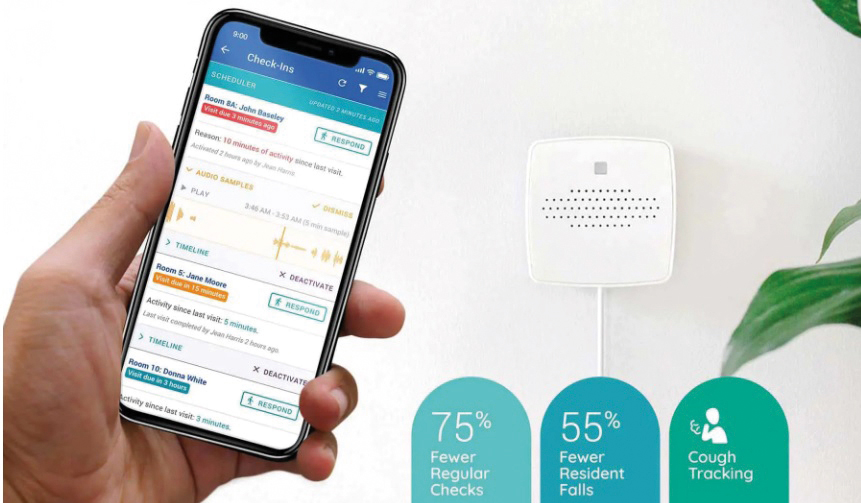
Jo Makosinski looks at how modern digital solutions can help to support people living with dementia
The design of the physical environment is crucial to promoting wellbeing and independence among people living with dementia.
But technology also has a key role to play and is increasingly being adopted to offer additional support to some of the most-vulnerable members in our society.
Josh Hough, founder and managing director at CareLineLive, said:
“When it comes to home care, there are several digital solutions that can have a positive impact on clients with dementia and their families.
“For example, digital rostering, notes, and care plans that are available on a carer’s mobile app can record a client’s details and assessments, alongside their preferences.
VISIBILITY ON DEMAND
“Alerts are then created if medication or visits are late or missed, which provides responsive care and greater peace of mind.
“Reports from digital solutions also allow care co-ordinators to roster the same carers to visits, thereby providing greater continuity of care, which is important for people with dementia.”
He added: “Alongside rostering, with a care portal like CareLineLive’s Care Circle, client and visit information is instantly updated and available to view by family members.
“By providing visibility ‘on[1]demand’ on medication, notes, and administration, there is better transparency of care.”
New research from the University of Lincoln has also found that sensors – including cameras, temperature and movement monitors – are ideal for safely observing people with dementia in their homes and supporting face-to[1]face care appointments.
A WEB OF SUPPORT
Dr Salah Al-Majeed, deputy head of the university’s School of Computer Science, said: “Technology offers increasing potential for new methods of diagnosing, detecting, and monitoring warning signs in vulnerable adults, and can also serve to connect friends, families, carers, and communities within a wider web of support.”
These remote monitoring technologies are also gaining traction in care homes and hospitals.
Swansea Bay University Health Board recently introduced Spirit Health’s CliniTouch Vie solution at its Hengoed Park and Hengoed Court dementia care facilities, enabling the mental health in-reach team to monitor patients on a regular basis and receive results in real time.
Funded by the Welsh Government through the Digital Solutions Fund, care workers complete bespoke and clinically led mental health questions, as well as taking each patient’s vital sign measurements.

FRIENDS OF THE ELDERLY
CliniTouch Vie then automatically analyses the data and generates a risk-scored list of prioritised actions, enabling the team to intervene and provide urgent care for referrals where required.
The impact of this type of technology was evidenced as part of a trial, funded by an NHS Digital Pathfinder grant, which saw wireless-enabled acoustic monitoring device placed in residents’ rooms at care homes run by Friends of the Elderly.
The AI capability powering the Allycare device filtered out background noise, worked out each resident’s activity profile based on sounds they make, and then classified and interpreted sounds according to whether they were normal or abnormal for that person.
As a result, the device could identify night-time events such as unusual movement or calls for help and raise an alert to staff.
These alerts were integrated with KareInn’s electronic care management system, a repository for all recorded data and care planning from pre[1]admission through to end of care or discharge.
And the results showed a 55% reduction in night-time falls and a 20% reduction in hospital admissions, compared to the previous nine months.
AIDING MEMORY
There was also a 75% reduction in the number of unnecessary physical night-time checks conducted by staff, saving approximately £13,000 per staff member per year.
AI technology is also supporting people with dementia in other ways.
Researchers at the National Robotarium, hosted by Heriot-Watt University and the University of Edinburgh, are currently developing an artificial intelligence (AI) companion that will aid memory recollection, boost confidence, and combat depression in people living with dementia.
The ground-breaking AI-driven Agent-based Memory Prosthesis to Encourage Reminiscing (AMPER) project will focus on personalised storytelling to help bring a patient’s memories back to the surface.
The project’s long-term vision is to help demonstrate how AI companions can become more widely used and integrated into domestic, health, and social care settings.
Professor Ruth Aylett from the National Robotarium is leading the research and said: “We know that people with dementia can experience very-different symptoms that require a range of support responses and current intervention platforms used to aid memory recollection often take a one-size-fits-all approach that isn’t always suitable to an individual’s unique needs.
“AI technology has the potential to play a pivotal role in improving the lives of people living with cognitive diseases and our ambition is to develop an AI-driven companion that offers patients and their caregivers a flexible solution to help give an individual a sustained sense of self-worth, social acceptance, and independence.
“Through projects like AMPER, we’re able to highlight the many ways AI and robotics can both help and improve life for people now and in the future.”

